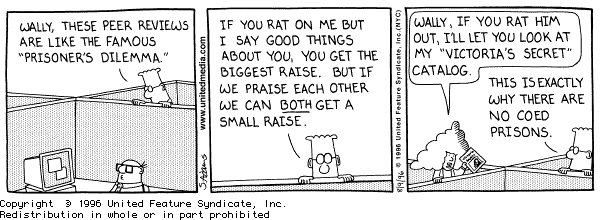Prisoner’s Dilemma makes an interesting case study because the equilibrium solution (Nash equilibrium) is where both players are worst off. While it’s in collective interest to cooperate, it’s in individual interest to defect. Read more on Wikipedia or the cartoon at the end of the post explains in just two lines! 🙂
A discussion on the draft drug pricing policy 2011 between A and S led to a dialogue on why our government is in huge deficit. S said something which A directly linked to something she had read a long time ago – Prisoner’s dilemma.
The dialogue and the linking was inspired A to share it here and carry on the discussion.
S: … but where will the government bring money from? Our government is already in a huge deficit.
A: But that’s because there are so many poorly managed subsidies.
S: We have subsidies on things like kerosene, diesel, farm electricity which is again for the same common man for whom you are asking for low-cost medicines. So why should you say that subsidies are not required.
A: Well because they are mismanaged. A rich farmer also gets the same subsidy as a poor farmer so the rich becomes richer. There should be means of ensuring that only the needy get the subsidy.
S: How do you do that? A western country subsidy model will not really work in India.
Take for example, in US, diesel for farm vehicles is subsidized. The subsidized diesel comes with red dye and hence called Red Diesel. People come and fill their own tanks – normal vehicles with the non-subsidized diesel and farm vehicles with red diesel. The Department of Transportation (a.k.a. our RTO) randomly stops vehicles for checking and if any vehicle other than farm vehicle is found to have the red diesel it is fined hefty.
But efficient monitoring of any such subsidy is difficult if not impossible in India. For starters, the ratio of police force to the population is fairly skewed and on top of that police is paid so little that corruption is easily justifiable.
It is in our collective interest to not misuse subsidies, if we have the means we should not use the subsidy but what happens in India is that people pay to get the BPL cards. People pay to get a caste certificate so that they can also use the reservation system.
The gap between the rich and poor is only increasing, so its every man for himself. The rich are busy getting richer, the poor are still in survival mode and the middle class stands divided. We are all looking out for ourselves. When the rich businessman is doing it, why shouldn’t I? I am anyway not making enough money; I don’t have money to give to the government. However if we all pay taxes, we will have better infrastructure and we will all be able to probably make more money. But, as prisoner’s dilemma shows, individually, paying less tax has a higher payout for me.
For our collective good, we should not defect but we seem to be stuck at the Nash Equilibrium where everyone defects. Do the game theorists have any suggestion of pulling us out of this Prisoner’s Dilemma?
Disclaimer: The views expressed here are just personal opinions. Neither A nor S are economists or management students. They just happen to be interested in their country’s economy and also just happen to know Prisoner’s Dilemma 🙂.
More debates and confusions on my mind:
Development – the debate –No approach in development is a clear right or wrong and so often we see opposite approaches for the same ends.
Storytelling for change – It’s important to tell the happy stories so that we don’t lose faith in each other but one bad incident, one negative story takes away the good done by other 99 positive incidents.


